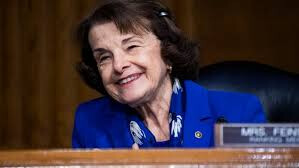
Dianne Feinstein, a ninety-year-old California senator who led the way for women in US politics during her more than thirty years in office, passed away.
As of Thursday, Feinstein, the US Senate’s oldest member, cast a vote.
The seasoned Democrat had been questioned for months for suspected memory and cognitive problems.
Following a “minor fall” at home in April, she was brought to the hospital as the most recent in a string of health issues.
The office of Ms. Feinstein released a statement stating that she died overnight at her residence in Washington, DC.
The statement said, “Senator Feinstein was a force of nature who made an incredible impact on our country and her home state.” “She left behind an incredible and indisputable legacy.”
Gavin Newsom, the governor of California, must now choose her replacement. In the past, he had promised to designate a black woman to complete her term, which expires in 2025.
Born in 1933, Ms. Feinstein attended Stanford University, lived in San Francisco, and was elected to the San Francisco County Board of Supervisors in 1969. Her lengthy career in public service began with that election, which eventually led to her being elected as San Francisco’s first female mayor and, in 1992, to the Senate.
She had earlier stated that she intended to retire at the end of the next year, but she refused to budge in response to mounting pressure. Several well-known Democrats, such as Katie Porter and Adam Schiff of Congress, have declared their intention to compete for her Senate seat in the past.
US President Joe Biden said that Ms. Feinstein “made history in so many ways, and our country will benefit from her legacy for generations” in a statement following her passing.
She had shingles earlier this year, which caused her to miss almost three months of work on Capitol Hill. After her return, she assumed fewer responsibilities and used a wheelchair to navigate the US Capitol. At times, she appeared perplexed in interviews, committee meetings, and voting on the floor.
As a well-known and passionate supporter of gun control legislation, Ms. Feinstein was also a strong proponent of the 1994 assault weapons prohibition that President Bill Clinton had signed into law.
Following the shooting deaths of city councilman Harvey Milk and her predecessor, George Moscone, she was elected mayor of San Francisco in 1978.
Later on, she related how she hurried to Mayor Moscone’s office and discovered a bullet hole while feeling for his pulse. She claimed that this incident would never leave her.
As a senator, Ms. Feinstein was the first female chair of the influential Senate Intelligence Committee. Following the 9/11 attacks in 2001, she oversaw a protracted investigation into the CIA’s contentious program of questioning foreign terrorists.
In the end, the assessment resulted in laws that forbade the use of “enhanced interrogation techniques” on suspects in terrorism, including waterboarding.
In addition, Ms. Feinstein was the first female chair of the Senate Rules Committee and the first female member of the Senate Judiciary Committee.
She stated that “being a woman in our society even today is difficult” in a 2017 interview with CNN.
She remarked, “I know it in the political arena.” “Today there are 24 women senators, up from two when I ran for office in 1992, and I know that number will keep rising.”
She had a reputation on Capitol Hill as a centrist who was willing to cooperate with her Republican opponents, which occasionally drew criticism from her own party’s more left-leaning members.
From colleagues on opposite sides of the political aisle, tributes flowed in.
California Democrat Nancy Pelosi referred to Ms. Feinstein as a “pioneering woman leader” in a statement.
For many decades to come, “Dianne’s extraordinary career will inspire countless women and girls to pursue public service,” the statement read.
Mitch McConnell, the Republican minority leader in the Senate, commended “her dogged advocacy and diligent service” while speaking on the chamber floor.
Some have called for her retirement in recent years due to concerns about her deteriorating health and cognitive ability, which has brought attention to the issue of aging politicians in America.
In one extensively shared video, she was heard being told by someone in her immediate vicinity to “just say aye” during a committee vote.
Her daughter Katherine, who has allegedly exercised power of attorney over her mother’s legal matters in the face of growing family strife, survives her.